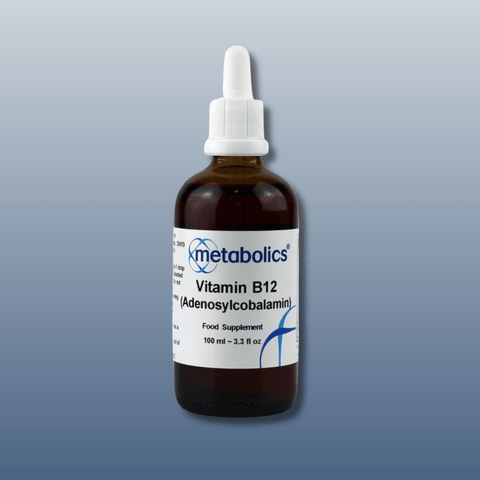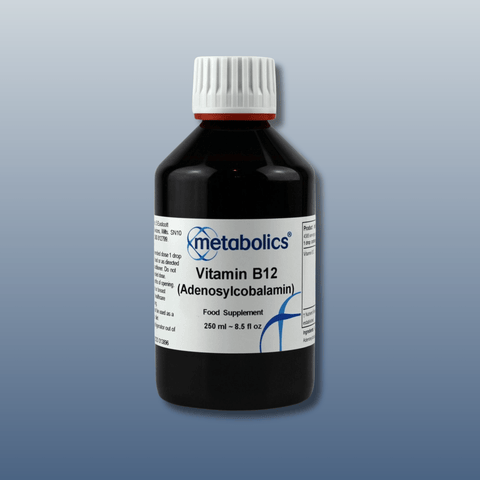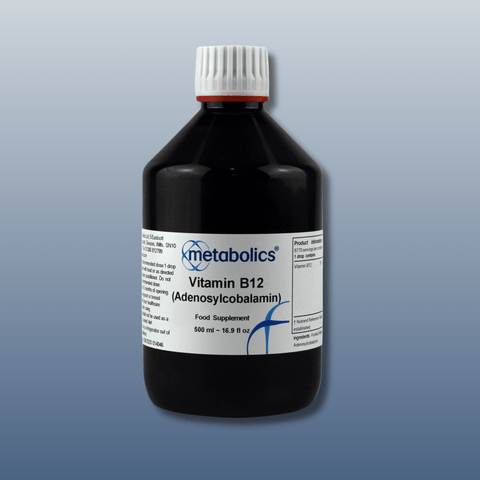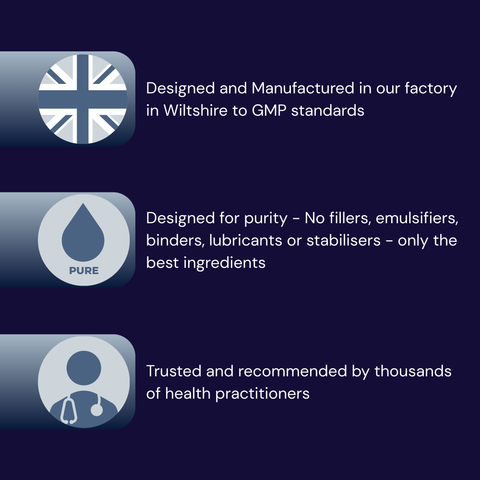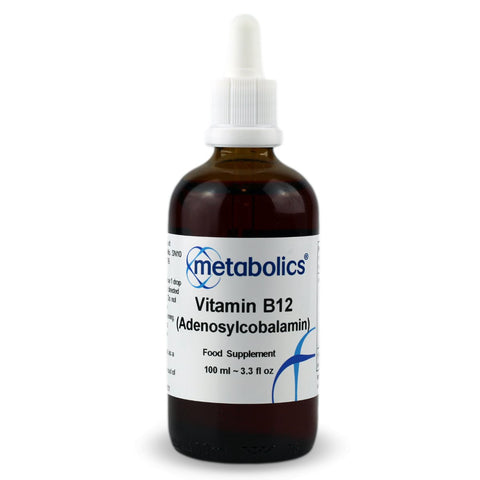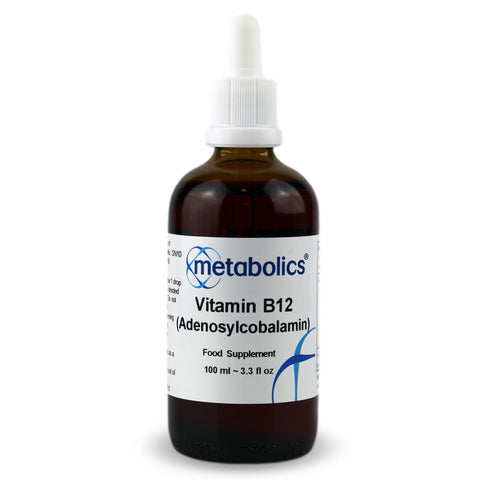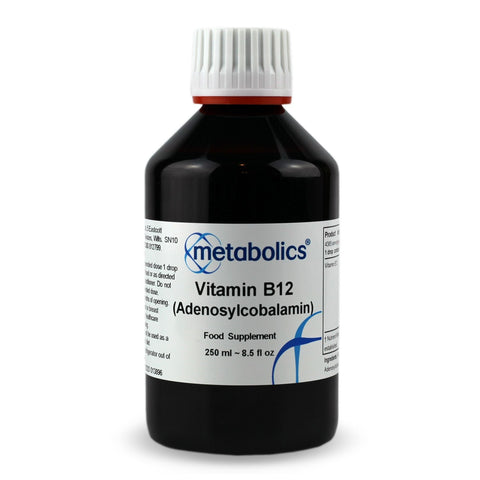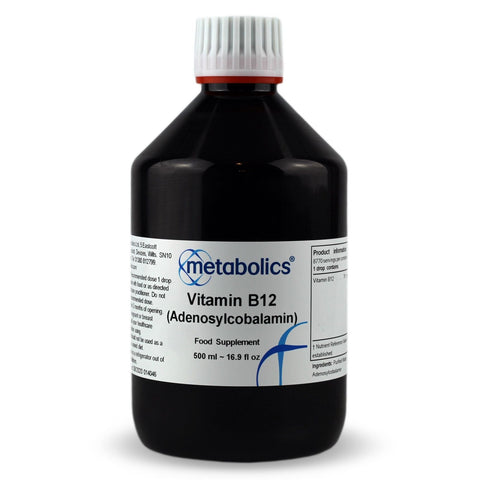Suitable For
Metabolics Vitamin B12 (Adenosylcobalamin) Liquid
What Is Metabolics Vitamin B12 (Adenosylcobalamin) Liquid?
Vitamin B12 is one of the 13 essential vitamins required for human health. Unlike other vitamins, it is not produced by plants or synthesised through sunlight exposure. Instead, it’s made by bacteria and is found naturally in animal-based foods such as meat, fish, dairy, and eggs.
Despite its presence in food, B12 absorption can be challenging due to a complex process involving stomach acid, digestive enzymes, and specific transport proteins. After being released from food in the stomach, B12 binds to haptocorrin, is released again in the small intestine, and finally binds to Intrinsic Factor to be absorbed in the ileum. From there, it is transported via Transcobalamin II to body tissues. Any disruption in this pathway — due to low stomach acid, gut issues, or dietary restrictions — can impact B12 status.
Vitamin B12 deficiency can affect anyone at any age, but certain groups are at higher risk. These include vegans and vegetarians, adults over 60, individuals with eating disorders such as anorexia or bulimia, and those taking medications like antacids or diabetes treatments that interfere with B12 absorption. People with a history of alcoholism, anaemia, or gastrointestinal conditions such as Crohn’s disease and IBS are also more vulnerable. Autoimmune conditions like type 1 diabetes, Addison’s disease, and SLE can increase risk, as can a family history of pernicious anaemia. Women with infertility or recurrent miscarriage, as well as infants born to or breastfed by deficient mothers, should also be aware of their B12 status.
What Is Adenosylcobalamin?
Adenosylcobalamin is a biologically active coenzyme form of vitamin B12, featuring a cobalt ion bound to a 5'-deoxyadenosyl group. It is primarily stored in the mitochondria — the energy-producing structures within cells — where it plays a vital role in converting methylmalonyl-CoA to succinyl-CoA, a key step in the citric acid cycle that supports energy production.
This form of B12 is particularly important for mitochondrial function and the metabolism of certain amino acids and fatty acids. In humans, it is found mainly in tissues such as the liver and is the dominant form in many non-human animals.
Metabolics Vitamin B12 (Adenosylcobalamin) Liquid offers an effective, bioavailable source of B12 in a convenient one-drop format — ideal for individuals seeking direct support for cellular energy metabolism.
What Is Metabolics Vitamin B12 (Adenosylcobalamin) Liquid For?
This supplement is designed to help maintain healthy B12 levels and support the essential functions B12 contributes to — including mitochondrial energy production, nervous system function, red blood cell formation, and immune health.
Key Benefits of Vitamin B12
✔ Contributes to Normal Energy-Yielding Metabolism
Supports mitochondrial energy production via the citric acid cycle, helping maintain physical and mental vitality.
✔ Supports the Normal Function of the Nervous System
Helps maintain healthy nerve cell function through its involvement in cellular energy pathways.
✔ Contributes to Normal Homocysteine Metabolism
As part of B12’s overall metabolic role, it supports the conversion of homocysteine — important for cardiovascular and metabolic health.
✔ Supports Normal Psychological Function
Supports brain and mood balance through its role in energy metabolism and neurological health.
✔ Contributes to Normal Red Blood Cell Formation
Essential for DNA synthesis and healthy blood cell development, which supports oxygen transport throughout the body.
✔ Supports the Normal Function of the Immune System
Helps maintain normal immune cell activity through its involvement in cellular function and metabolism.
✔ Has a Role in the Process of Cell Division
Plays a vital part in normal cell replication, especially in tissues with high turnover such as skin and gut lining.
✔ Contributes to the Reduction of Tiredness and Fatigue
By supporting mitochondrial energy production and red blood cell formation, B12 can help reduce tiredness and support daily energy levels.
Signs of Vitamin B12 Deficiency May Include:
• Persistent tiredness or weakness
• Numbness or tingling in the hands and feet
• Low mood or irritability
• Difficulty concentrating or brain fog
• Pale skin or breathlessness
• Digestive discomfort or constipation
• Slow healing or frequent infections
• Skin pigmentation changes or premature greying
Who Is Metabolics Vitamin B12 (Adenosylcobalamin) Liquid For?
This supplement is ideal for individuals who:
✔ Seek targeted support for mitochondrial energy production
✔ May not be absorbing enough B12 from food
✔ Follow a vegan, vegetarian, or plant-based diet
✔ Prefer a bioavailable, conversion-ready B12 supplement in liquid form
Why Choose Metabolics Vitamin B12 (Adenosylcobalamin) Liquid?
🔹 Scientifically Supported – Backed by UK and EFSA-authorised health claims
🔹 Mitochondrial Form of B12 – Supports direct cellular energy production
🔹 Flexible Liquid Format – One-drop dosing for ease and precision
🔹 Third-Party Tested – Independently verified for quality, safety, and purity
Flexible Dosing for Individual Needs
Each serving of Metabolics Vitamin B12 (Adenosylcobalamin) is just one drop, making it easy to take and suitable for daily use. However, the bottle(s) contains a generous number of servings to support flexible dosing, particularly for practitioners who may wish to tailor intake to individual requirements. This format ensures both convenience for everyday users and professional-level adaptability where personalised nutritional protocols are needed.
✅ Order Metabolics Vitamin B12 (Adenosylcobalamin) Liquid Today!
Support your energy metabolism and overall wellbeing with this high-quality, active B12 supplement.
Supplement Facts
1 drop contains
%NRV*
Vitamin B12
76 ug
3040%
† Nutrient Reference Value (NRV*) not established
Ingredients
Directions / Dosage
 Liquid
Liquid
Warning
Storage
Product Type


